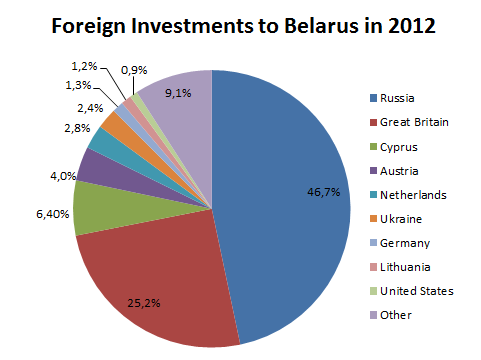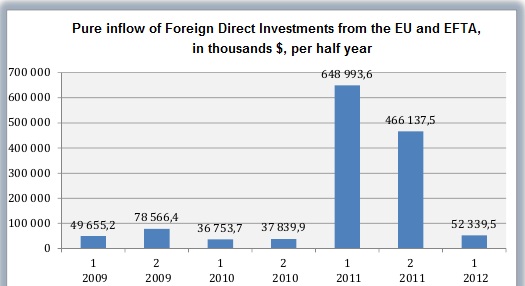Lukashenka’s Annual Address: Accept Change or Remain on the Periphery of History

On 19 April Alexander Lukashenka delivered his annual address to the nation and parliament. For more than three hours he has been speaking about priorities on his current political and economic agenda and answered MPs’ questions.
Economic modernization, privatisation and relations with the EU and Russia featured at the top of his agenda. All the topics went under an unusual headline – changes for modernisation.
Like Lukashenka’s most public appearances, the address was full of self-promotion and contradictory remarks. On the one hand, he made several reform-oriented declarations. But at the same time he clearly reiterated the limits of what he intends to do.
Talking to the Nation
Like any charismatic political leader Alexander Lukashenka loves all sorts of occasions when he can talk directly to the whole nation. He regularly holds massive press-conferences for Belarusian and foreign media. He also meets journalists for short Q&A sessions during his visits to factories and collective farms in the country’s regions. All these media appearances are then extensively covered by state and oppositional TV channels and newspapers.
During such events Lukashenka does his best to demonstrate that he stays in good physical shape and remains a master of public speaking. He laughs, jokes and holds friendly conversations with journalists. Sometimes he talks about his private affairs and sometimes sheds a bit of light on high-level negotiations with foreign leaders. In other words, he normally says what ordinary people like to hear.
He also uses public speaking occasions to deal with the most sensitive current issues. He aims to make sure that Belarusians are aware of his own arguments and to beat the arguments of his opponents until they gain any ground in society. That is why, unlike the notorious public events of the Soviet times, Lukashenka’s speeches and press-conferences do not avoid contradictory issues.
Annual addresses to the nation and parliament, that usually take place in April, also serve these PR purposes (like in any other country). But they additionally have a bit of special taste as their primary objective is to present Lukashenka's political and economic priorities.
Economic Renewal for Increased Competitiveness
Lukashenka opened his address on 19 April with traditional words of praise towards the Belarusian socioeconomic model. He emphasised that the economy had overcome the financial crisis and now showed signs of healthy stability.
Immediately after that he accepted that at the same time economic problems were growing. According to Lukashenka, those problems come from Russia and the EU, where markets for Belarusian goods are shrinking.
“The key problem of our economy is competitiveness of Belarusian goods. To be winning in the highly competitive war on the world market we all the time need to update our knowledge, technologies, equipment and management systems. Therefore, today the fundamental idea for Belarus is the idea of a renewal”, said Lukashenka.
At the same time the Belarusian strongman reiterated that the renewal does not imply abandoning the existing economic model and ideology. It should only be a new stage in the development of the generally successful development strategy.
He suggested three big national projects that, in his opinion, would make an overall renewal possible. Firstly, economic modernization. Secondly, informatization of the society. Thirdly, support of young people in order to involve more of them in the process of state development.
Lukashenka also underlined that Belarus can not isolate itself from global processes. Therefore, he concluded that the county's options look limited: "accept change or remain on the periphery of history".
Modernization Explained
Numerous commentators keep asking the question of what stands behind the Belarusian government’s modernization rhetoric. Alexander Lukashenka gave them a sufficient answer last Friday.
The reason is simple: Russia has already joined the World Trade Organisation and Kazakhstan, the other Customs Union partner, is on the way there. This means increasing competition for Belarusian producers. Therefore, there is no other option but quickly modernise the economy.
By announcing that the modernization of the wood-processing industry has to be completed in early November Lukashenka again demonstrated what he means by the very term “modernization”. For him and his inner circle it appears like simply moving from point A to point B. As soon as they reach point B modernization will terminate.
In other words, the authorities see economic modernization as changing equipment: let’s instal 100 new machines and build 50 new walls and we will be done with this modernization!
The Economics of Foreign Policy
The economic block of the address then transformed into foreign policy. Here Lukashenka managed to comment on virtually everything.
He said that the relations with the European Union would now depend on the EU. If there is will on the part of the EU to improve the status quo Belarus then “will walk its walk very quickly”. It is difficult to guess what exactly he implied by this walk. Presumably, it reflects the unfolding behind-the-scenes negotiation process between Minsk and European capitals. And most probably it centres on the issue of the political prisoners.
The Belarusian ruler also went back to his recent visits to South-East Asia (Indonesia and Singapore). He once again offered his rationale for travelling to such distant corners of the world stressing the potential for trade with the region.
Then he proceeded to his usual rhetoric words about the significance of “third world” countries for Belarusian foreign economic relations. He even reiterated the governing rule of the Belarusian foreign policy: “we have to go there where we are welcome”.
The Russian Front
But the most exciting part of the whole address began when Alexandr Lukashenka tackled the Belarus-Russia relations.
He began with banal compliments to the Customs Union and Single Economic Space and promised that the Eurasian integration would soon bear its tasty fruit for the Belarusians. But later he turned to the issue of privatisation in the bilateral relations that traditionally tears apart many agreements.
After months of public and closed talks about the prospects of MAZ/KAMAZ unification Lukashenka boldly denounced the idea. He simply said that he did not see any value added in the prospective unification. And that according to his sources, the whole idea got inspiration from some Western competitors of MAZ, who only wish to destroy the Belarusian giant.
Lukashenka then moved on to the issue of privatisation in general. At this point he asked the Russians “not to bind us a lot”. In the president’s opinion, the market “is in its lowest point”. And one can only privatise very cheap, which is not going to be the case in Belarus.
Interestingly, the following Monday morning some Russian newspapers already published an unofficial response to Lukashenka’s address. They said that the Kremlin decided to suspend the signing of oil contracts Belarus was hoping to conclude.







